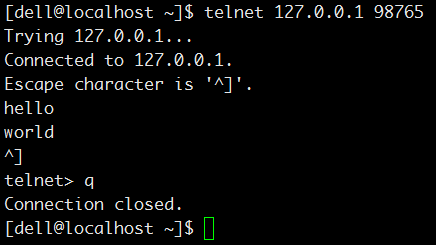epoll测试实例
|
1
2 3 4 5 6 7 8 9 10 11 12 13 14 15 16 17 18 19 20 21 22 23 24 25 26 27 28 29 30 31 32 33 34 35 36 37 38 39 40 41 42 43 44 45 46 47 48 49 50 51 52 53 54 55 56 57 58 59 60 61 62 63 64 65 66 67 68 69 70 71 72 73 74 75 76 77 78 79 80 81 82 83 84 85 86 87 88 89 90 91 92 93 94 95 96 97 98 99 100 101 102 103 104 105 106 107 108 109 110 111 112 113 114 115 116 117 118 119 120 121 122 123 124 125 126 127 128 129 130 131 132 133 134 135 136 137 138 139 140 141 142 143 144 145 146 147 148 149 150 151 152 153 154 155 156 157 158 159 160 161 162 163 164 165 166 167 168 169 170 171 172 173 174 175 176 177 178 179 180 181 182 183 184 185 186 187 188 189 190 191 192 193 194 195 196 197 198 199 200 201 202 203 204 205 206 207 208 209 210 211 212 213 214 215 216 217 218 219 220 221 222 223 224 225 226 227 228 229 230 231 232 233 234 235 236 237 238 239 240 241 242 243 244 245 246 247 248 249 250 251 252 253 254 255 256 257 258 259 260 261 262 263 264 265 266 267 268 269 270 271 272 273 274 275 |
#include <stdio.h>
#include <stdlib.h> #include <string.h> #include <sys/types.h> #include <sys/socket.h> #include <netdb.h> #include <unistd.h> #include <fcntl.h> #include <sys/epoll.h> #include <errno.h> static int flags = fcntl (sfd, F_GETFL, ); flags |= O_NONBLOCK; ; static int memset (&hints, , sizeof (struct addrinfo)); s = getaddrinfo (NULL, port, &hints, &result); for (rp = result; rp != NULL; rp = rp->ai_next) s = bind (sfd, rp->ai_addr, rp->ai_addrlen); close (sfd); if (rp == NULL) freeaddrinfo (result); return sfd; int ) sfd = create_and_bind (argv[]); s = make_socket_non_blocking (sfd); s = listen (sfd, SOMAXCONN); efd = epoll_create1 (); event.data.fd = sfd; /* Buffer where events are returned */ /* The event loop */ n = epoll_wait (efd, events, MAXEVENTS, -); else if (sfd == events[i].data.fd) in_len = sizeof in_addr; s = getnameinfo (&in_addr, in_len, /* Make the incoming socket non-blocking and add it to the event.data.fd = infd; ) count = read (events[i].data.fd, buf, sizeof buf); /* Write the buffer to standard output */ if (done) /* Closing the descriptor will make epoll remove it free (events); close (sfd); return EXIT_SUCCESS; |
具体函数介绍请参考:https://banu.com/blog/2/how-to-use-epoll-a-complete-example-in-c/
运行结果:
服务器端:

客户端:

epoll测试实例的更多相关文章
- JMeter学习-026-JMeter 分布式(远程)参数化测试实例
以前文所述对文章详情的HTTP请求进行性能测试为例.日常实际场景中,不可能所有的人都在同时访问一篇文章,而是多人访问不同的文章,因而需要对文章编号进行参数化,以更好的模拟日常的性能测试场景.同时,因文 ...
- webservice测试实例
webservice测试实例(LR8.1) 接口声明:这个接口是sina的短信服务接口,我只是用来做脚本学习使用,不会对其产生压力:希望读者也只是用来进行录制学习,而不是产生压力. 接口文档:http ...
- [原]在Fedora中编译Libevent测试实例
在我的昨天的博文<[原]我在Windows环境下的首个Libevent测试实例>中介绍了在Windows环境下如何编译一个echo server例子.今天我又试了一下在Linux环境中编译 ...
- C++动态链接库测试实例
前话 上一章节我导出了一个动态链接库 要使用该链接库,我们还需要该链接库对外公开的函数,即头文件 下面开始实例 测试实例 第一步--将动态链接库的dll.lib.和头文件导入项目中 文件目录如下: 项 ...
- Linux下简易蜂鸣器驱动代码及测试实例
驱动代码: #include <linux/module.h> #include <linux/kernel.h> #include <linux/init.h> ...
- 微服务架构 - 离线部署k8s平台并部署测试实例
一般在公司部署或者真实环境部署k8s平台,很有可能是内网环境,也即意味着是无法连接互联网的环境,这时就需要离线部署k8s平台.在此整理离线部署k8s的步骤,分享给大家,有什么不足之处,欢迎指正. 1. ...
- WinForm中 Asp.Net Signalr消息推送测试实例
p{ text-align:center; } blockquote > p > span{ text-align:center; font-size: 18px; color: #ff0 ...
- Confluence 6 从生产环境中恢复一个测试实例
请参考 Restoring a Test Instance from Production 页面中的内容获得更多完整的说明. 很多 Confluence 的管理员将会使用生产实例运行完整数据和服务的 ...
- Rabbit简单测试实例
Rabbit简单测试实例 安装环境: Yum -y install python-pip Pip install pika 生产者 1 2 3 4 5 6 7 8 9 10 11 import pik ...
随机推荐
- 图像bayer格式介绍以及bayer插值原理CFA
1 图像bayer格式介绍 bayer格式图片是伊士曼·柯达公司科学家Bryce Bayer发明的,Bryce Bayer所发明的拜耳阵列被广泛运用数字图像. 对于彩色图像,需要采集多种最基本的颜色, ...
- HDU--4768
题目: Flyer 原题链接:http://acm.hdu.edu.cn/showproblem.php?pid=4768 分析:二分.只需要注意到最多只有一个为奇数,则可以首先求出学生获得的总的传单 ...
- Centos7.2安装tomcat+Myeclipse(遇到的一些问题与总结)+web项目实战
工作环境:centos7.2 PS:没有耐心的同学可以直接跳到后面的安装方法,对于安装方法大多是网上的,我只是做相关收集和总结 给个tomca和Myeclipset折腾的半死,现在做一些总结1.一定要 ...
- 【Asp.net入门3-04】使用jQuery-使用jQuery事件
- python net-snmp使用
安装 官网:http://www.net-snmp.org/download.html 环境:CentOS 6.6 + python 2.7.10 1.下载安装包 net-snmp-5.6.2.1.t ...
- bzoj千题计划152:bzoj3405: [Usaco2009 Open]Grazing2 移动牛棚
http://www.lydsy.com/JudgeOnline/problem.php?id=3405 n个牛棚,n-1段 因为要求距离尽量大,而且尽可能多的为d 所以: 第1个牛棚一定在位置1 最 ...
- [php]php总结(1)
1.变量可以连续传递赋值2.var_dump()打印变量信息3.isset()与unset()4.可变变量$p = "temp";$$p则表示$temp变量,即最右边的变量的值为下 ...
- 平铺式窗口管理器 Musca 初体验
作者: 吴吉庆 Version: 1.0 release: 2009-11-04 update: 2009-11-04 为什么用平铺式窗口管理器? 什么是平铺式窗口管理器(tiling window ...
- <eq>标签
链接:http://document.thinkphp.cn/manual_3_2.html#taglib <eq name="menu.id" value="1& ...
- Mysql服务优化
Mysql服务优化 Mysql服务加速优化的6个阶段 硬件层面优化 操作系统层面优化 Mysql数据库层面优化 网站集群架构层面优化 安全优化 流程.制度控制优化 1.硬件层面优化 CPU ...
